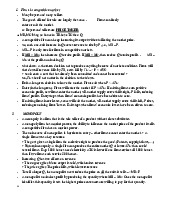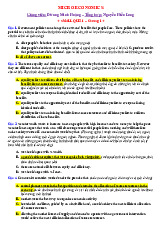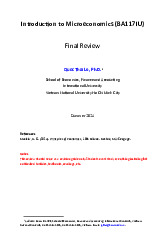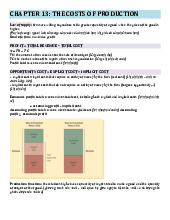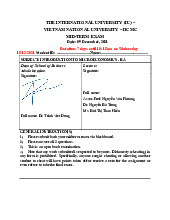




Preview text:
BỘ GIÁO DỤC VÀ ĐÀO TẠO
Trường Đại học Quốc Tế - Đại học Quốc gia TP.HCM
KHOA QUẢN TRỊ KINH DOANH --------------- ---------------
TIỂU LUẬN CUỐI KỲ MÔN KINH TẾ VI MÔ
ĐỀ TÀI: MONOPOLY IN THE U.S AND THE U.S POLICY
Giảng viên: Cao Minh Mẫn
Học và tên: Võ Hồng Ngọc MSSV: BABAIU22540
Hồ Chí Minh,25 tháng 01 năm 2022 Bài làm
No one could have guessed that the legal characteristics of a Trust would be closely
linked to monopoly and the history of anti-monopoly in the future. The story of
antimonopoly, or anti-Trust, in the United States originates from one of the most classic
trusts in history: John Davidson Rockefeller's Standard Oil Trust.
In fact, the ideas of controlling the formation of large companies with the ability to
monopolize and manipulate the market existed before the antitrust laws were enacted.
The laws of Ohio (where Rockefeller's Standard Oil Company was headquartered at the
time) prohibited a company in this state from owning oil refineries or buying shares of
other companies outside the state. Therefore, despite having almost unlimited financial
resources, Rockefeller's ambition to control the black gold industry was limited by the
corporate laws of Ohio at that time until 1879, when a lawyer named Samuel C.T. Dodd
came up with a superlative idea: to form a Trust in the oil industry throughout the United States.
Members and shareholders of dozens of oil companies throughout the United States
agreed to establish a Trust, according to which, as Settlors, they contributed almost all
of their shares in these oil companies to the Trust. Then they designated and authorized
Rockefeller and eight others as Trustees (in a Board of Trustees) responsible for
managing and operating the entire assets of the Trust. In return, the Settlors of the Trust
are also the Beneficiaries, who receive profits based on the assets of the shares in the oil
companies they contributed to the Trust.
Thus, in 1882, the greatest Trust in the history of the United States was established: the
Standard Oil Trust. The Standard Oil Trust is not a business, so it is not limited by the
laws of Ohio as mentioned earlier, nor does it have to go through the registration process
as a business, thereby avoiding supervision from regulatory agencies and the public for
a long time. The Trust is also tightly organized, under a Board of Trustees (which is
mainly Rockefeller's authority), coordinating committees are also established to help the
Board of Trustees manage the enormous assets and activities of the Trust. Through the
Trust, the oil companies agreed to unify prices, methods of exploration, transportation
and distribution of oil, and thus Rockefeller, as a Trustee along with eight others, almost 1
manipulated the entire US oil industry (by 1890, the Standard Oil Trust controlled more
than 88% of oil supply and more than 90% of oil transportation and consumption within
the country). Moreover, Standard Oil Trust also controlled the railroad industry and related service industries.
So, in essence, the Standard Oil Trust agreement mentioned above takes the form of a
cartel, which is an agreement/union aimed at manipulating the market and capable of
restricting competition. However, it is organized and operates much more tightly and
efficiently than traditional cartels or syndicates in Europe.
The excessive power of the Standard Oil Trust ultimately caused concern among the
US government and citizens. Moreover, the success of the Standard Oil Trust in
controlling the oil industry led to a phenomenon where a series of other trusts were also
established in various industries of the economy (including the coal, steel, sugar, tobacco,
biscuit, and canned meat industries).
Since then, in the eyes of the US government and citizens, trust has gradually become
synonymous with monopoly and market manipulation. Even "anti-trust" has become a
slogan in presidential or congressional elections of politicians at the time. Rockefeller
and the Standard Oil Trust became enemies of the public and the government. As a result,
in 1890, the competition law, which focused on anti-monopoly, was passed by the US
Senate under the name "Sherman Antitrust Act," proposed by Senator Sherman.
The Anti-Trust Law prohibits "any agreements, trusts, or similar forms of collusion or
any conspiracy aimed at limiting trade or commerce between states or with foreign
countries," as well as prohibiting "anyone from creating or intending to create a
monopoly." Meanwhile, coincidentally, the state of New Jersey also amended its
corporate law at that time, allowing a company to own shares in companies in other states.
The prohibition of the Anti-Trust Law and the new provisions of New Jersey's
corporate law led the leaders of Standard Oil Trust to make the decision to dissolve the
Trust and establish the Standard Oil Company of New Jersey, in the form of a Holding
Company (a company that only holds a controlling stake in other businesses but does 2
not directly engage in the production of goods or the provision of services. This event
also gave birth to the holding company model in the world, and this model has been
widely applied to this day - holding companies often hold the core position of
economic conglomerates). With the Standard Oil Holding Company, Rockefeller and
other oil tycoons continued to dominate the market by holding shares in dozens of subsidiary companies.
The rest is history. Concerned about the power of Standard Oil, the US Department of
Justice accused Standard Oil of violating the prohibitions of the Sherman Antitrust
Act, and in 1911, the US Supreme Court ruled in a landmark decision to force the
breakup of Standard Oil into 34 competing companies.
In addition to the Sherman Antitrust Act, in 1914, the United States also enacted the
Clayton Antitrust Act and the Federal Trade Commission Act. These are the three most
important laws and serve as the foundation for perfecting competition and anti-
monopoly policies in the country. 3 4
